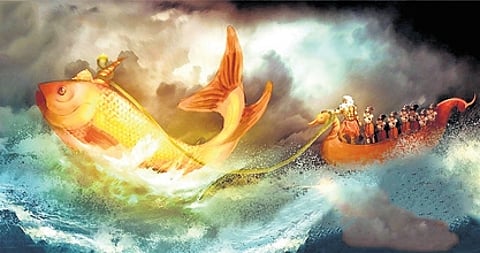

Throughout the annals of history, civilisations have grappled with the profound question of humanity’s ultimate destiny, crafting elaborate mythologies of cosmic destruction and renewal. These ancient tales not only reflect cultural beliefs but also offer timeless insights into human aspirations, fears and the eternal cycle of existence. From the fiery cataclysms of Greek mythology to the cyclic rebirths of Hindu cosmology, let us embark on a journey of diverse ancient cultures.
In the realm of Greek mythology, the concept of ‘ekpyrosis’ serves as a vivid portrayal of the end of humanity. According to the works of Hesiod, Zeus, the ruler of the gods, possesses the power to unleash ekpyrosis on the world, heralding a tumultuous era. Yet, intertwined with this cataclysmic upheaval lies the promise of renewal.
Drawing parallels to the Greek mythos, Norse mythology envisages the end of humanity through the apocalyptic event known as Ragnarök. This unfolds as a series of harrowing events culminating in a climactic battle between the gods and the forces of chaos. As deities like Odin and Thor meet their fates in the fiery fray, the world is engulfed in flames and submerged beneath the deluge, only to emerge anew from the ashes.
In Hindu mythology, the concept of ‘Pralaya’ portrays the end of humanity as a period of cosmic dissolution, wherein the universe is engulfed in the purifying flames of destruction. During pralaya, all living beings are consumed, and the fabric of existence is reset, laying the foundation for the emergence of a new cycle of creation. Through this eternal dance of destruction and renewal, Hindu cosmology emphasises the transient nature of existence and the inexorable march of time.
Turning to the ancient civilisation of Egypt, the end of humanity is envisioned through the mythic conflict between the sun god Ra and the primordial serpent Apep, personifying the eternal struggle between order and chaos. In this cosmic battle, Ra emerges triumphant, ensuring the continuity of the world and reaffirming the Egyptians’ belief in the cyclical rhythm of life and death.
Meanwhile, Mesopotamian mythology recounts the epic tale of Gilgamesh and the great flood unleashed by the gods to cleanse the earth of humanity’s corruption. Mirroring narratives found in other cultures, this myth symbolises divine judgment and the preservation of life through the guidance of a chosen survivor, echoing themes of redemption and renewal.
Beyond the realms of ancient Europe and the Near East, the indigenous peoples of the Americas also envisioned the end of humanity through mythic narratives such as the Aztec legend of the Five Suns. According to Aztec cosmology, each sun represents a previous world age, with the current Fifth Sun destined to end in a cataclysmic earthquake, marking the culmination of a cosmic cycle and paving the way for a new era of existence.
In the cosmology of Zoroastrianism, an ancient Persian religion, the end of humanity is prophesied in the form of a final battle between the forces of good and evil. During this cataclysmic confrontation, the righteous will prevail, heralding the dawn of a new era of eternal peace and harmony, reflecting the Zoroastrian belief in the ultimate triumph of righteousness over darkness.
Across diverse ancient mythologies and cultures, the end of humanity is portrayed as a testament to the enduring human quest for meaning and understanding in the face of the unknown. Whether through cataclysmic events, cosmic battles, or cycles of dissolution and rebirth, these narratives resonate with profound symbolism and universal themes, inviting contemplation of the human condition and our place within the vast tapestry of existence.
The end of humanity according to different ancient mythologies and cultures offers a panoramic vista of human imagination and belief, spanning continents and epochs to illuminate the timeless quest for transcendence and understanding. As we journey through these mythic landscapes, we are reminded of the enduring power of storytelling to inspire wonder, provoke introspection, and forge connections across the vast expanse of time and space.